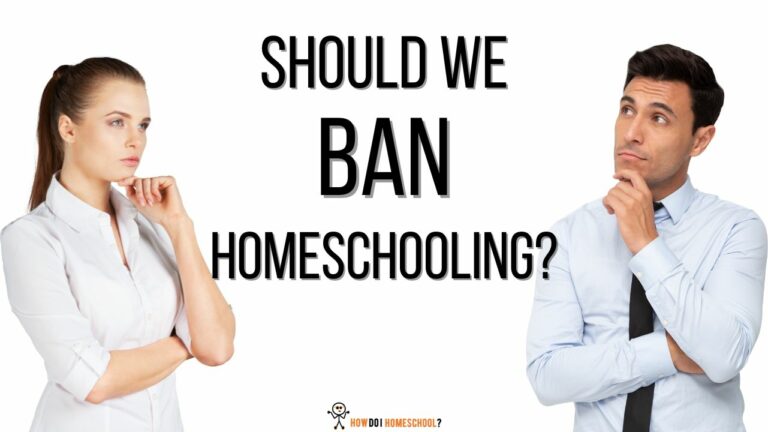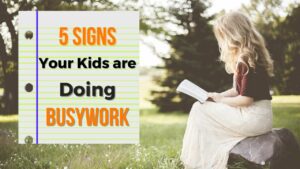In recent years, homeschooling has become a more popular option for parents who are not satisfied with the education their children are receiving at public schools. However, some people believe that homeschooling should be banned or made illegal because they believe it is not in the best interest of the child.

I hope you enjoy reading this blog post. If you want to do my course on how to homeschool, click here.
While homeschooling may not be the best option for every family, should it be banned or illegal completely? We consider a number of arguments in this post.
1. Homeschooling should be banned because it’s unregulated.
This argument assumes that everything is better with regulation. Regulation provides jobs for government bureaucrats- and surely that’s a good thing?
Well, that’s not always right. Indeed, sometimes regulation just leads us to run sterile and boring lives. It can stop us from being creative and stop us from encouraging our children to be creative.
Part of the reason why homeschools produce more entrepreneurs is due to the increased freedom homeschoolers experience. Alongside formal learning, many homeschoolers are encouraged to make their own fun and do their own learning.
Homeschoolers have time to do this because they are subject to less regulation than schools.
I won’t say homeschools have no regulations. Indeed, the amount of regulation depends on state laws.
But, it’s never been proven that regulation is good for homeschools.
Indeed, homeschools perform well above average when comparing test scores of homeschooled vs. public school students.
2. Homeschooling should be banned because parents will abuse their kids
If you send children to school, families can be monitored, so you can pick up child abuse cases (so the argument goes).
But really – think about it. Should we really start from the position that parents are potentially guilty of child abuse?
Because, in the vast majority of cases, parents love and protect children and would do anything for them. It’s more of a rarity when a parent is abusive.
We should say that although abuse does happen in some homeschools – and homeschooling can magnify this abuse – love, care, and encouragement can also be magnified in the homeschool situation.
This makes homeschooling, on the whole, a better situation for students. Furthermore, Brian Ray, after looking into 8 studies on homeschool abuse and neglect, concluded, ‘At this point, there is little evidence that the public schooled or private schooled are abused, neglected, or otherwise maltreated at any higher or lower rate than the homeschooled.’
And let’s think about schools’ history of abuse.
You need to completely ignore that some schools have a history of child abuse.
I would like to see this argument addressed, especially in light of the Royal Commission on Child Abuse in various school institutions today.
Also, consider that sending children to school for a few hours a day won’t stop child abuse from happening anyway. If a child in an abusive household goes to school, they’ll still have to spend holidays and out-of-school hours at home in that abusive situation.
3. Kids might get a bunch of HOLES in their education
Homeschooling should be banned because parents might just miss something…like Algebra. Or some other subject (that, yes, you may not ever use in your whole life…but it’s considered compulsory learning).
Of course, you also have to ignore that schools regularly have massive holes in their curriculum.
They don’t teach life skills.
And they don’t teach financial education very well. (In fact, in Australia, they have big banks coming in to get kids to open up accounts with their bank. They call this financial education, although some it has been called marketing dressed up as education by this financial counselor and guru).
Admittedly there are cases where parents don’t worry about teaching their children to read until the children themselves want to read.
These parents are usually unschoolers.
I was previously skeptical of the unschooling approach, thinking it would create a lot of dropout kids who don’t want to learn anything.
But, time and experience with families like these have taught me these kids become quite entrepreneurial as their education is more interest-based…so they learn more on the whole – even if they learn to read later than school children learn to read.
4. Homeschooling Should be Banned Because It Doesn’t Pass on ‘Vital Knowledge’ As Public Schools Do
I have heard it argued that public schools pass on ‘vital knowledge’ that might be missed if children homeschool.
But what do we mean by vital knowledge?
We’ve talked about public schools teaching subjects in a comprehensive way, but we’ve also talked about public schools missing teaching a whole lot of helpful life skills too (like cooking, budgeting, cleaning, gardening, basic carpentry, and handiwork).
Perhaps the issue here is that people are afraid parents will pass on traditional values…and not values that the government wants to promote.
For example, many parents don’t want their children to do sex ed until later in life.
Some, if not most, public schools are teaching sex ed in primary school.
Many parents also feel the government also wants to promote progressive ideas that erode the family unit and undermine parental authority (I’m thinking about lowering the age where children can consent to sex changes without parental permission etc).
If this is what it means to miss ‘vital knowledge’ then I’m afraid you’d have to say most homeschools don’t teach these things – and they’re well pleased that they don’t.
5. Homeschool should be banned because of abnormal socialization
We shouldn’t homeschool children because children really do need to play with 30 kids their own age to learn societal norms and values, so the argument goes. And we should all really be learning the same thing to be able to interact harmoniously.
The argument continues that we all need to go to school to have meaningful and constructive engagements with our fellow citizens after our schooling days have ended.
Besides, schools expose children to a diversity of backgrounds so students can be exposed to different belief systems, socio-economic, and ethnic backgrounds.
But, the above arguments assume homeschooling families interact with only similar families. Is there any evidence for this?
No, to the contrary, homeschooling families interact with other families who provide a very diverse range of ages that schoolchildren won’t usually see if they go to school.
That’s because homeschoolers generally interact with other families (that contain 0-50 year olds on average) and society at large (which contains people of all ages).
Homeschoolers can interact with babies as well as older adults. They learn to talk to an adult as well as to young children.
Furthermore, in their community interactions, they are exposed to people of differing belief systems, socioeconomic, and ethnic backgrounds. I agree that socialization can be restricted in a homeschool situation, but it can also be restricted in a school situation.
I’m thinking of all-white schools. Indeed, when one sends a child to school, they have to go to their local school and aren’t allowed to go out of their catchment area.
That means that schoolchildren don’t always have a large difference in ethnic or socio-economic backgrounds either.
6. Homeschooling creates a bubble
Some people claim that parents control a child’s environment and social interactions too much when they homeschool. They claim homeschoolers live in a social bubble that is unrealistic and doesn’t reflect society at large.
However, school isn’t exactly a mirror of society either. At what point after leaving school are we ever required to socialize only with children our own age?
Furthermore, at what point in life are we required to endure verbal bullying (and sometimes physical) and call it ‘resilience training’. It seems many school students actually have abnormal socialization compared to society.
Certainly, homeschoolers often live ‘in a bubble’.
Yes, they don’t have to undergo the same level of bullying. Yes, they receive more love from the people around them. And yes, they get sheltered from sexual content and exposure.
But these are probably better things than the opposite scenario.
And then, not all homeschoolers live in a bubble.
As a homeschooler myself, our family were directly integrated into society and interacted with the local community and sports clubs.
We ran community events and even participated in local school events when homeschooled.
In this way, parents can teach homeschoolers in real-time as they interact with people, which gives kids real-time feedback on interactions. This is instead of having to do damage control with kids who’ve had negative interactions some time past in school and parents have only just now found out about it!
7. Homeschooling should be banned as it doesn’t pass on societal values
If we hold ‘societal values’ to mean ‘government-approved societal values’ then yes, homeschooling may fail to do that.
However, suppose we define societal values as values that much of our society holds. In that case, homeschooling does an admirable job as parents do a better job of passing on these values to their kids.
Why do they do a better job?
Because in school, not only do teachers pass on values, but peers pass on values. Peer values can be good or bad (i.e. bad peer pressure).
On the other hand, a parent can teach children good values and correct them immediately when they see bad habits and values forming.
Siblings will, for the same reasons stated in the previous sentence, exert better peer pressure than schoolchildren by contrast.
8. We should ban homeschooling as it isolates children
Children can be isolated, even if surrounded by 30 children their own age. I went to school, and this was my experience.
Lunch and recess breaks were extremely lonely affairs.
When I was homeschooled, I always had friends because my parents and brothers were always around. We also had lots of homeschooled families we socialized with.
This said homeschooling can be isolating if parents don’t make an effort to socialize. But, in my experience, most homeschool parents are hyper-aware of this issue and make an extra effort to homeschool.
9. Homeschooling Should be Banned Because Parents Have Less Incentive to Vaccinate
The homeschooling population is, I believe, a less vaccinated population in general.
There is less peer pressure in the homeschool environment from other parents, so parents don’t feel the need to vaccinate as strongly as school parents.
Unless a homeschool parent feels there is medical evidence behind vaccination, they simply won’t vaccinate their children.
But should we ban homeschooling based on vaccination?
Doesn’t this arguement come back to choice? That is, should a person have the right to refuse vaccination? Should a parent have the right to decide for their children? Well, that’s a whole other argument…
Even if the government decided vaccination had to be compulsory, we don’t need to ban homeschooling because of that.
10. Homeschooling Deprives Children of the Opportunity of Involvement in Extra-Curricular Activities
Those who hold this perspective haven’t had much to do with homeschoolers!
On average, homeschoolers are involved in an extraordinary number of extra-curricular activities.
Because homeschoolers only do an average of two to three hours of formal work a day, they have lots of spare time to work on other projects. This means they’re able to get involved in many extra-curricular activities that school students can’t do.
Also, because they’re not tired, they participate with more energy and brain power in their activities.
This is in contrast to school students who often have to do extracurricular activities after or before school when they’re tired and just want to go home!
11. Homeschooling Should be Banned Because Kids Need Other Mentors Besides Parents
Some argue that parents are too close to children to see their offspring’s whole and real potential. Children, opponents argue, need mentors outside the family environment to help them reach their true potential (their self-actualized potential, if you like).
But, this assumption that children need a super-non-parent mentor (presumably a teacher) is completely without basis.
Furthermore, teachers and other school staff are present in such a low ratio that they wouldn’t be able to give up their time for children, even if they did want to give every child-focused mentoring opportunity.
By contrast, a parent to offspring ratio is far less, and parents are more interested in mentoring students.
There seems to be the case also that parents would make better mentors as they know their child’s strengths and weaknesses better by virtue of spending more time studying their children over time.
They also have more love for them, so they’ll be more motivated to spend more time mentoring and teaching good habits to their children.
12. Homeschooling should be banned as Homeschoolers Grow up with a Narrow Worldview
Most homeschoolers in the United States are homeschooling primarily because they want to provide religious and moral instruction to their children.
The argument then goes that children who are homeschooled because of this reason will grow up with a narrow worldview. Public school, on the other hand, will give children a breadth of experience and teach children from a neutral standpoint.
The belief that any school is neutral is ludicrous.
While a public school says it has no religion, that’s not true.
Its religion is Religious Humanism and Atheism. And public school students are indoctrinated with religion as much as religious schools aim to indoctrinate their students. Public schools get plenty of converts from religious families too.
13. We should ban homeschooling because it teaches children that public school is bad
Guilty as charged in many homeschools. But don’t parents have the right to choose what is good and bad for their own children?
The truth is that many people believe public schools are places where bullying is rife, political correctness reigns, and governments have free access to indoctrinate children as they will.
Are these beliefs without basis?
Given lots of kids are walking out of high school practically illiterate, it’s no wonder homeschool parents don’t want their kids to have any part of the school system.
14. Homeschooling should be banned because Parents aren’t trained teachers
Some argue that parents can’t give their children a proper education if they aren’t trained teachers, particularly if they don’t have an advanced or college education themselves.
Homeschooling opponents also argue that even if parents were trained teachers, they wouldn’t be able to give their children enough time during the day to teach them, as school days are usually 6 or 7 hours long.
The argument is saying also that non-teachers have nothing to offer homeschoolers…they can’t teach them much worth knowing. This is manifestly untrue.
Furthermore, a good homeschool should teach children to teach themselves.
Also, homeschooled students have better test scores than public school students (as previously noted) indicating that a teaching background doesn’t matter that much.
Finally, many parents let their children learn from school curriculum like BJU Press. In many cases, these curriculum programs are taught by online teachers or through teachers’ manuals.
15. We Aren’t Familiar with It – So Let’s Ban Homeschooling
Many people have no experience with the benefits of homeschooling your child. Compared to school, home education is a very unusual educational method.
I study that I previously read (but I can’t seem to find now!) showed me that people who haven’t had personal contact with homeschoolers tend to be less favorably disposed towards home education. Conversely, those who know homeschoolers tend to look more favorably upon homeschooling.
When I hear of educational professors from Harvard writing articles on banning homeschooling, I wonder if they’ve had that much contact with homeschooling families.
As someone who went to school myself and then was homeschooled, I can testify my home education experience was better socially, mentally, physically, spiritually, and certainly academically.
It was:
- socially better because I was able to interact with people of all ages – not just children in my own age group
- mentally better because my parents were able to show me more love and spend more time with me than my teacher could at school
- physically better because we did much more exercise at home, and my brothers and I even became elite athletes in the cycling field
- spiritually better because we were able to spend more time reading the Bible, praying, and improving our relationship with Jesus
- academically better because my parents could spend more one-on-one time with us troubleshooting academic problems
I would really encourage people to get to know a few homeschooled families before calling for a ban on homeschooling.
Should We Really Ban Homeschooling?
A growing body of educational research testifies to the effectiveness of homeschool education. Those who consider why homeschooling should be banned do not have good evidence behind their arguments. I believe many who tout this position have little experience with the benefits of homeschooling and may be laboring under the belief of a series of homeschool myths. Homeschooling, while not a panacea, does provide a solid educational outcome in most cases and should be encouraged as providing our society with a great alternative to traditional education.



